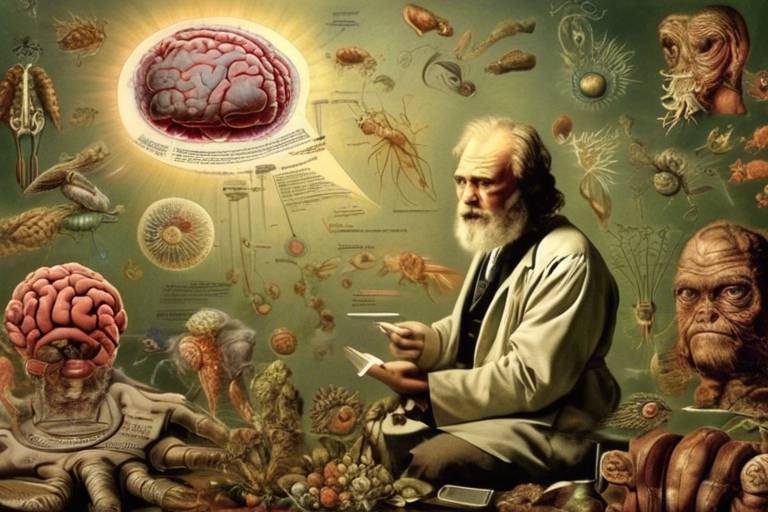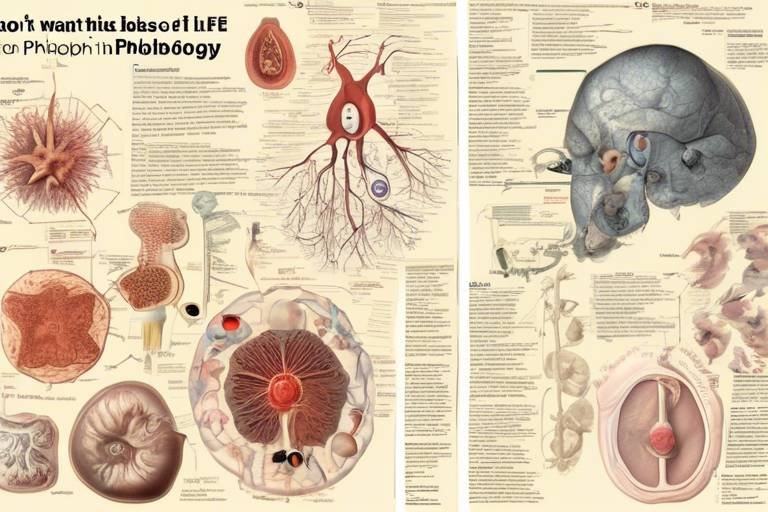Philosophy and Theoretical Biology - An Unexplored Interaction!
Have you ever pondered the intricate dance between philosophy and theoretical biology? It’s like a captivating tango that many have overlooked, yet it holds the potential to unlock profound insights into the nature of life itself. Philosophy, with its rich tapestry of thought, provides a lens through which we can scrutinize the fundamental questions of existence, while theoretical biology offers a scientific framework to explore the mechanisms of life. Together, they create a dialogue that not only enriches our understanding of biological systems but also challenges our ethical perspectives and assumptions about the world around us.
Imagine standing at the crossroads of these two fields, where questions about what it means to be alive intersect with the rigorous demands of scientific inquiry. This intersection invites us to ask: How do our philosophical beliefs shape our understanding of biological concepts? and Conversely, how can biological discoveries inform our philosophical outlook? This article aims to delve into this fascinating interplay, revealing how philosophical concepts can illuminate biological theories and how biological realities can provoke philosophical reflection.
As we embark on this journey, we’ll explore various philosophical frameworks that have significant implications for biological research. From reductionism—the idea that complex systems can be understood by examining their individual parts—to holism, which argues for a more integrated approach, these concepts shape the methodologies scientists employ in their research. Additionally, we’ll examine how emergent properties challenge traditional views, suggesting that the whole can indeed be greater than the sum of its parts.
Moreover, we cannot overlook the ethical dimensions that arise at this intersection. The ethical implications of biological research are profound, especially in areas like genetic engineering, where the manipulation of life forms raises critical questions about morality and responsibility. As we navigate through these discussions, we’ll highlight the importance of bioethics in guiding research practices, ensuring that the quest for knowledge does not come at the expense of ethical considerations.
Finally, we’ll look towards the future, envisioning a landscape where philosophy and biology collaborate more closely. This synergy could lead to innovative solutions to some of the most pressing biological challenges we face today. So, buckle up as we dive into this unexplored interaction, where the realms of thought and science converge to deepen our understanding of life and existence!
- What is the relationship between philosophy and biology? Philosophy provides critical frameworks that help us question and understand biological concepts, while biology offers empirical insights that can influence philosophical thought.
- How do philosophical concepts affect biological research? Philosophical perspectives can shape research methodologies, influence data interpretation, and guide ethical considerations in biological studies.
- What are emergent properties in biology? Emergent properties refer to characteristics of complex biological systems that cannot be understood solely by examining individual components, highlighting the importance of holistic approaches.
- Why is bioethics important in biological research? Bioethics ensures that ethical considerations are prioritized in research practices, safeguarding against potential moral dilemmas that arise from scientific exploration.

The Role of Philosophy in Biology
Philosophy serves as a vital compass in the vast ocean of biological inquiry, providing critical frameworks that help us navigate through complex concepts and ethical dilemmas. It encourages scientists to question their assumptions, pushing them to explore the underlying principles that govern life itself. For instance, when biologists study ecosystems, philosophy prompts them to consider not just the interactions between species, but also the ethical implications of their research. This philosophical lens enriches scientific discourse, guiding researchers in making informed decisions that can have profound impacts on both nature and society.
Moreover, philosophy fosters a deeper understanding of biological theories. It challenges the status quo and encourages a more nuanced approach to biological research. By integrating philosophical concepts, biologists can explore questions such as: What does it mean to be alive? How do we define species? These inquiries are not merely academic; they have real-world implications, influencing conservation efforts, medical ethics, and even public policy. For example, when discussing the conservation of endangered species, philosophical debates about intrinsic value versus utilitarian value can shape the strategies employed to protect these organisms.
In addition to ethical considerations, philosophy influences the methodologies used in biological research. The choice between reductionist and holistic approaches can dictate how scientists design experiments and interpret data. Reductionism, which focuses on breaking down complex systems into their constituent parts, often leads to a detailed understanding of specific mechanisms. However, this approach can overlook the interactions and relationships that give rise to emergent properties in biological systems. On the other hand, a holistic perspective emphasizes the importance of understanding the system as a whole, which can be crucial for studying ecosystems or understanding complex diseases.
To illustrate the impact of philosophy on biology, consider the following table that summarizes key philosophical influences on biological research:
| Philosophical Concept | Influence on Biology |
|---|---|
| Reductionism | Focuses on understanding biological systems by examining their individual components. |
| Holism | Emphasizes the importance of studying systems as integrated wholes, considering interactions and relationships. |
| Emergence | Challenges reductionist views by highlighting properties that arise from complex interactions, not predictable from individual parts. |
In summary, the role of philosophy in biology is multifaceted and indispensable. It not only enriches the scientific dialogue but also shapes the methodologies and ethical considerations that guide biological research. By fostering a deeper understanding of life and existence, philosophy and biology together can illuminate the intricate tapestry of life, helping us to appreciate the complexity and beauty of the natural world.

Key Philosophical Concepts in Biology
The realm of biology is not just a collection of facts and figures; it is deeply intertwined with philosophical concepts that shape our understanding of life itself. At the heart of this interaction are several key philosophical ideas that have significantly influenced biological theories and methodologies. These concepts include reductionism, holism, and emergent properties. Each of these ideas offers a unique lens through which scientists can examine the complexities of living organisms and their interactions within ecosystems.
Reductionism is the approach that seeks to understand complex systems by breaking them down into their constituent parts. Imagine trying to understand a car by simply examining its individual components—like the engine, wheels, and chassis—without considering how they work together. This method has its merits, especially in molecular biology, where understanding the interactions of genes and proteins can lead to significant breakthroughs. However, it begs the question: can we truly grasp the essence of a living organism by isolating its parts?
On the flip side, holism posits that systems should be viewed as wholes, rather than merely a collection of parts. This perspective emphasizes the interdependence of components within biological systems. For instance, consider an ecosystem. It is not enough to study individual species in isolation; one must also consider how these species interact with one another and their environment. Holistic approaches can lead to a more comprehensive understanding of ecological dynamics, which is crucial for conservation efforts and biodiversity preservation.
Then we have emergent properties, which challenge the traditional reductionist viewpoint. Emergent properties refer to characteristics that arise when components interact in complex ways, resulting in behaviors or phenomena that cannot be predicted simply by examining the individual parts. Think of a flock of birds; the stunning patterns they create in the sky cannot be understood just by looking at a single bird. This idea has profound implications for biology, suggesting that the study of life must encompass not only the individual components but also the interactions and relationships that give rise to new qualities.
The interplay between reductionism and holism, along with the recognition of emergent properties, has significant implications for research methodology in biology. For example, a researcher who adopts a reductionist approach may focus on isolating specific genes to understand a disease, while another who embraces a holistic perspective might explore how environmental factors influence gene expression and disease outcomes. This divergence in philosophical stances can lead to markedly different research designs and interpretations of data, ultimately shaping the trajectory of scientific discovery.
In summary, the key philosophical concepts of reductionism, holism, and emergent properties are not just abstract ideas; they are foundational to the way we conduct biological research. By acknowledging and understanding these concepts, scientists can foster a more nuanced and effective approach to exploring the mysteries of life. The ongoing dialogue between philosophy and biology will undoubtedly continue to enrich our understanding of existence, prompting us to ask deeper questions about life, its origins, and its future.
- What is reductionism in biology? Reductionism is the approach that seeks to understand complex biological systems by breaking them down into their individual parts.
- How does holism differ from reductionism? Holism emphasizes understanding systems as wholes, considering the interactions and relationships between components, rather than isolating them.
- What are emergent properties? Emergent properties are characteristics that arise from the interactions of components in a system, which cannot be predicted by examining the parts alone.
- Why are these philosophical concepts important? They guide research methodologies and influence how scientists approach the study of biological systems, ultimately shaping our understanding of life.

Reductionism vs. Holism
The debate between reductionism and holism in biology is not just a theoretical exercise; it’s a fundamental question that shapes how we understand life itself. At its core, reductionism posits that complex systems can be understood by breaking them down into their individual components. Imagine trying to understand a car by examining just the engine or the wheels—this is the essence of reductionism. It’s a powerful approach that has yielded significant insights, particularly in molecular biology, where understanding the interactions of genes and proteins can lead to breakthroughs in medicine.
On the flip side, holism argues that the whole is greater than the sum of its parts. This perspective suggests that complex biological systems, like ecosystems or human bodies, cannot be fully understood by merely dissecting them into smaller pieces. Think of a symphony orchestra: each musician is important, but it’s the collective performance that creates the music. Holism emphasizes the interconnectedness of biological elements and the emergent properties that arise from their interactions.
To illustrate the differences, consider the following table:
| Aspect | Reductionism | Holism |
|---|---|---|
| Definition | Understanding systems by analyzing their parts | Understanding systems by looking at the whole |
| Approach | Analytical | Synthetic |
| Examples | Studying genes, proteins, and cells | Studying ecosystems, populations, and behaviors |
| Key Question | What are the components? | How do the components interact? |
These contrasting viewpoints lead to significant implications for research methodology in biology. For instance, a reductionist approach may lead scientists to focus on gene editing as a way to cure diseases, while a holistic approach might encourage the study of lifestyle and environmental factors that contribute to health. This divergence in perspectives can profoundly affect experimental design, data interpretation, and even the formulation of biological theories.
In practice, many biologists find themselves navigating between these two paradigms. They might employ reductionist techniques to isolate variables in a controlled experiment while also considering the holistic implications of their findings. This interplay is crucial, as it encourages a more comprehensive understanding of biological phenomena. Ultimately, the reductionism vs. holism debate serves as a reminder that while we can dissect life into its components, we must also appreciate the intricate tapestry that emerges from their interactions.

Implications for Research Methodology
When we dive into the world of biology, it's fascinating to see how our philosophical stance can dramatically shape the way we conduct research. Imagine approaching a complex biological question with a reductionist mindset, where the focus is on understanding the smallest components of a system. This perspective often leads researchers to dissect organisms down to their DNA, proteins, and cells, believing that by understanding these parts, they can fully grasp the whole. However, this approach can sometimes overlook the intricate interactions and relationships that occur within biological systems. The reductionist view might lead to important discoveries, but it can also create blind spots, as it fails to account for the larger context in which these components operate.
On the other hand, adopting a holistic approach encourages researchers to consider the organism as a whole, including its environment and the various interactions it has with other organisms. This perspective can lead to richer insights, especially in fields like ecology and evolutionary biology, where understanding the interconnectedness of life is crucial. For instance, when studying ecosystems, a holistic approach might reveal how changes in one species can ripple through the entire community, affecting everything from nutrient cycling to predator-prey relationships.
The implications of these philosophical perspectives extend beyond just the theoretical. They influence research methodologies, shaping everything from experimental design to the interpretation of data. For example, a researcher with a reductionist viewpoint may design experiments that isolate variables to determine cause-and-effect relationships. In contrast, a holistic researcher might employ observational studies that capture the complexity of interactions in natural settings. This divergence can lead to vastly different conclusions and even conflicting findings in the scientific literature.
Furthermore, the choice of methodology can also affect the reproducibility and applicability of research findings. In a world where science is increasingly scrutinized for its reliability, understanding the philosophical underpinnings of research practices becomes critical. A study grounded in reductionism may yield precise, quantifiable results, but those results might be less applicable to real-world scenarios where multiple factors interact dynamically. Conversely, holistic studies may provide broader insights but can sometimes lack the rigor of controlled experiments.
In summary, the philosophical foundations we choose to embrace in biological research profoundly influence our methodologies and the conclusions we draw. As scientists continue to navigate the complexities of life, recognizing the interplay between philosophy and methodology will be essential for advancing our understanding of biological systems. The dialogue between reductionism and holism not only enriches scientific inquiry but also enhances our ability to address pressing biological challenges in a more informed and responsible manner.

Case Studies in Biological Research
When delving into the fascinating world of biological research, case studies serve as a compelling lens through which we can view the intricate dance between philosophy and science. Each case study not only illuminates specific biological phenomena but also reveals the philosophical underpinnings that guide scientific inquiry. For instance, consider the groundbreaking research on the human genome. This study not only advanced our understanding of genetics but also sparked profound ethical debates regarding privacy, consent, and the potential for genetic discrimination. The philosophical questions surrounding the implications of mapping the human genome are as significant as the scientific discoveries themselves.
Another illuminating example is the study of ecosystem dynamics. Researchers investigating the interactions within ecosystems often grapple with the philosophical concept of holism. This approach emphasizes that the whole is greater than the sum of its parts, leading scientists to consider how various species interact and contribute to the stability of their environment. When examining case studies of ecosystems, such as the reintroduction of wolves in Yellowstone National Park, we see how philosophical perspectives can shape our understanding of ecological balance and biodiversity. The wolves' presence not only affected the deer population but also led to a cascade of ecological changes, illustrating the emergent properties of complex systems.
Moreover, the field of cancer research provides yet another case study rich with philosophical implications. As scientists explore the genetic and environmental factors contributing to cancer, they often encounter the reductionist approach, focusing on individual genes or mutations. However, the multifaceted nature of cancer challenges this viewpoint, necessitating a more integrated perspective that considers the interactions among various biological systems. This intersection of reductionism and holism in cancer research highlights the importance of philosophical awareness in guiding research methodologies and interpretations.
To further illustrate the impact of philosophical perspectives on biological research, let's take a look at a comparative table of case studies:
| Case Study | Philosophical Perspective | Key Findings |
|---|---|---|
| Human Genome Project | Ethics of Genetic Privacy | Discovery of genetic markers raised concerns about discrimination. |
| Yellowstone Wolves | Holism | Reintroduction led to ecological balance and biodiversity enhancement. |
| Cancer Research | Reductionism vs. Holism | Need for integrated approaches to understand cancer complexity. |
These case studies exemplify how philosophical concepts are not merely abstract ideas but are vital to the scientific process. They shape the questions researchers ask, the methodologies they employ, and the interpretations they make. By fostering a deeper understanding of the philosophical dimensions of biological research, scientists can better navigate the ethical landscapes and complexities inherent in their work.
- What is the significance of philosophy in biological research?
Philosophy provides frameworks for questioning assumptions, guiding ethical considerations, and enriching scientific discourse. - How do reductionism and holism differ in biological studies?
Reductionism focuses on understanding complex systems by examining their individual parts, while holism emphasizes the importance of the system as a whole. - Why are case studies important in understanding the interplay between philosophy and biology?
Case studies illustrate how philosophical perspectives influence research methodologies and outcomes, highlighting the importance of philosophical awareness.

Emergent Properties in Biological Systems
When we delve into the realm of biology, one of the most fascinating concepts that emerge is the idea of emergent properties. These properties refer to characteristics of a system that arise from the interactions of its individual components, which cannot be predicted by merely examining those components in isolation. Imagine a flock of birds; while each bird follows simple rules of movement, the stunning formation they create together is an emergent property that cannot be explained by looking at a single bird alone. This phenomenon challenges the traditional reductionist perspective that has dominated biological research for decades.
Emergent properties are particularly significant in complex biological systems, where the interactions between components lead to unexpected behaviors and functions. For instance, consider the human brain. It is composed of billions of neurons, each with its own function. However, the thought processes, emotions, and consciousness that arise from the intricate network of these neurons are emergent properties that cannot be attributed to any single neuron. This realization has profound implications for how we study biology, as it encourages scientists to adopt a more holistic approach to understanding life.
To illustrate the concept further, let’s take a look at some key examples of emergent properties in biological systems:
- Cellular Metabolism: The interactions between various cellular components lead to metabolic processes that sustain life.
- Ecological Systems: Ecosystems exhibit emergent properties such as biodiversity and stability, which arise from the complex interactions among species and their environments.
- Social Behavior in Animals: The collective behavior of social animals, such as ants or bees, showcases emergent properties that facilitate survival and efficiency.
Understanding emergent properties is not just an academic exercise; it has real-world implications. For instance, in environmental biology, recognizing how ecosystems function as integrated wholes rather than mere collections of individual organisms can inform conservation strategies. Similarly, in medicine, acknowledging the emergent properties of biological systems can lead to more effective treatments that consider the patient as a whole rather than just focusing on isolated symptoms.
As we continue to explore the intricate dance of interactions within biological systems, it becomes clear that emergent properties challenge us to rethink our approaches to research and inquiry. By embracing these concepts, we can foster a deeper understanding of the complexities of life and perhaps uncover new pathways to address some of the most pressing challenges in biology today.
Q1: What are emergent properties?
Emergent properties are characteristics of a system that arise from the interactions of its individual components and cannot be predicted by examining those components in isolation.
Q2: Can you give an example of emergent properties in biology?
A classic example is the behavior of a flock of birds, where the collective movement and formation cannot be understood by analyzing a single bird alone.
Q3: Why are emergent properties important in biological research?
They encourage a holistic approach to studying biological systems, leading to more comprehensive understandings and practical applications in fields like ecology and medicine.

Ethics in Theoretical Biology
The intersection of ethics and theoretical biology is a fascinating and complex domain that raises numerous questions about the moral implications of biological research. As scientists delve deeper into the mysteries of life, they encounter ethical dilemmas that challenge not only their scientific understanding but also their moral compass. For instance, when we manipulate genetic material or engage in cloning, we must ask ourselves: what are the consequences of our actions? Are we playing God, or are we simply advancing human knowledge?
One of the primary ethical concerns in theoretical biology is the impact of research on living organisms and ecosystems. As we explore the genetic underpinnings of various species, we must consider the potential repercussions of our findings. For example, the introduction of genetically modified organisms (GMOs) into the environment can lead to unforeseen ecological consequences. This raises the question: should we prioritize scientific advancement over the health of our planet? The ethical implications are profound, and they require careful consideration and dialogue among scientists, ethicists, and the public.
Moreover, the field of bioethics plays a crucial role in guiding research practices in biology. Bioethics is the study of the ethical issues arising from advances in biology and medicine. It emphasizes the importance of conducting research responsibly and with respect for all living beings. Researchers are encouraged to adhere to ethical guidelines that promote transparency, informed consent, and the humane treatment of animals used in experiments. These principles help ensure that the pursuit of knowledge does not come at the expense of ethical integrity.
To illustrate the ethical landscape in theoretical biology, consider the following table summarizing key ethical principles and their applications:
| Ethical Principle | Description | Application in Research |
|---|---|---|
| Informed Consent | Participants must be fully informed about the research and its potential risks. | Required in human subject research. |
| Animal Welfare | Ensuring humane treatment and minimizing suffering of animals in research. | Guidelines for laboratory animal care. |
| Environmental Responsibility | Considering the ecological impact of biological research. | Assessing risks of GMOs before release. |
Additionally, philosophical perspectives on genetic engineering highlight the need for deep inquiry into the ethical and societal implications of manipulating biological systems. As we unlock the secrets of DNA and explore the potential for genetic modifications, we must grapple with questions about identity, consent, and the natural order. Are we altering the very fabric of life, and if so, what does that mean for future generations? These are not just scientific questions; they are profoundly philosophical ones that require interdisciplinary collaboration to navigate.
In conclusion, the relationship between ethics and theoretical biology is intricate and vital. As we forge ahead into uncharted territories of biological research, it is imperative that we remain vigilant about the ethical implications of our work. By fostering a culture of ethical awareness and dialogue, we can ensure that our scientific endeavors contribute positively to society and the natural world. The future of biology is not just in the hands of scientists but also in the hands of philosophers, ethicists, and the public who engage in these critical conversations.
- What is the role of bioethics in biological research? Bioethics guides researchers in making ethical decisions, ensuring that their work respects living beings and the environment.
- How does genetic engineering raise ethical concerns? Genetic engineering can have significant implications for ecosystems, species identity, and future generations, prompting debates about its moral acceptability.
- Why is informed consent important in research? Informed consent ensures that participants are aware of the risks and benefits of research, allowing them to make educated decisions about their involvement.

Bioethics and Research Practices
Bioethics serves as a crucial compass in the often tumultuous waters of biological research, guiding scientists through a maze of ethical dilemmas and moral quandaries. As we delve deeper into the intricate world of biological systems, the responsibility of researchers becomes ever more significant. After all, the questions that arise are not just about what we can do, but also about what we should do. This distinction is vital in ensuring that scientific advancements do not come at the expense of ethical considerations.
Researchers must navigate a landscape where the potential for groundbreaking discoveries exists alongside ethical pitfalls. For instance, when conducting experiments on living organisms, scientists must weigh the benefits of their research against the potential harm inflicted on these beings. This is where the principles of bioethics come into play—ensuring that research practices adhere to standards that respect life and promote welfare.
One fundamental aspect of bioethics is the concept of informed consent. This principle emphasizes that participants in research studies, whether human or animal, should be fully aware of the nature of the research, its potential risks, and benefits before agreeing to participate. The importance of informed consent cannot be overstated; it embodies respect for autonomy and fosters trust between researchers and subjects. As such, researchers are encouraged to be transparent about their methods and intentions.
Moreover, bioethics also addresses issues of justice and equity in research practices. It calls for fair distribution of the benefits and burdens of research, ensuring that no group is unfairly targeted or exploited. For example, historically marginalized communities have often been subjected to unethical research practices without their consent. This has led to a growing emphasis on inclusive research practices that prioritize the voices and rights of all participants, thereby promoting a more equitable scientific landscape.
Furthermore, as biotechnology advances, new ethical dilemmas emerge, particularly in areas like genetic engineering and synthetic biology. These fields challenge our traditional notions of life and raise questions about the extent to which we should manipulate biological systems. Researchers are thus encouraged to engage in ethical reflection and dialogue, considering not only the scientific implications of their work but also the broader societal impacts.
In conclusion, bioethics is not merely an add-on to biological research; it is an integral part of the scientific process. By embedding ethical considerations into research practices, scientists can ensure that their work contributes positively to society while respecting the dignity of all living beings. As we continue to push the boundaries of biological understanding, the role of bioethics will only become more prominent, guiding researchers toward responsible and conscientious scientific exploration.
- What is bioethics? Bioethics is a field of study that examines the ethical implications of biological research and practices, focusing on issues such as informed consent, justice, and the moral status of living beings.
- Why is informed consent important in research? Informed consent ensures that participants are fully aware of the research they are involved in, allowing them to make educated decisions about their participation while respecting their autonomy.
- How does bioethics influence research practices? Bioethics influences research practices by providing a framework for evaluating the ethical implications of research methods and ensuring that the rights and welfare of participants are prioritized.
- What are some ethical concerns in genetic engineering? Ethical concerns in genetic engineering include the potential for unintended consequences, issues of consent, and the societal implications of manipulating genetic material.

Philosophical Perspectives on Genetic Engineering
Genetic engineering is a fascinating yet contentious field that raises profound philosophical questions about the nature of life, the limits of human intervention, and the ethical responsibilities that come with such power. Imagine wielding a tool that allows you to edit the very blueprint of life itself—sounds like something out of a science fiction novel, right? But this is the reality we face today. As we delve into the philosophical implications of genetic engineering, we must consider not only the scientific possibilities but also the moral and ethical dimensions that accompany them.
At the heart of the debate is the question of what it means to manipulate life. Are we merely enhancing nature, or are we playing god? This dilemma reflects a deeper philosophical inquiry into the essence of existence and our place within it. The implications of genetic modifications extend beyond individual organisms; they ripple through ecosystems and human society. For instance, the introduction of genetically modified organisms (GMOs) into agriculture has sparked discussions on biodiversity, food security, and environmental sustainability.
Moreover, the concept of “naturalness” comes into play. What does it mean for something to be “natural”? If we alter the genetic makeup of an organism, are we stripping it of its inherent identity? This line of thinking leads to a broader discussion about the value of biodiversity and the potential consequences of homogenizing life forms. The pursuit of genetically engineered crops that yield higher outputs may seem beneficial at first glance, but could it also lead to a loss of genetic diversity that is crucial for the resilience of our food systems?
Another area of concern is the potential for inequality that genetic engineering could exacerbate. As advancements in biotechnology continue to unfold, there is a real risk that access to these technologies could be limited to those who can afford them. This raises ethical questions about justice and equity. Will genetic enhancements become a privilege of the wealthy, creating a new class of genetically superior individuals? Or will society find a way to ensure that the benefits of genetic engineering are shared broadly? The answers to these questions are not straightforward and require careful philosophical consideration.
To further illustrate these points, we can examine some of the key philosophical perspectives on genetic engineering:
| Philosophical Perspective | Key Concerns | Implications |
|---|---|---|
| Utilitarianism | Maximizing benefits for the greatest number | Focus on outcomes, but may overlook individual rights |
| Deontological Ethics | Adherence to moral rules and duties | Emphasizes the intrinsic value of all life forms |
| Virtue Ethics | Focus on moral character and intentions | Encourages responsible stewardship of genetic technologies |
As we navigate these complex waters, it’s crucial for scientists, ethicists, and society at large to engage in ongoing dialogue about the implications of genetic engineering. This dialogue should not only involve biologists and geneticists but also philosophers, ethicists, and representatives from diverse communities. By fostering an inclusive conversation, we can better understand the multifaceted nature of genetic engineering and its potential to shape our future.
In conclusion, the philosophical perspectives on genetic engineering challenge us to reflect deeply on our values and responsibilities in a world where the boundaries of life are increasingly malleable. As we stand on the brink of unprecedented scientific capabilities, we must ask ourselves: What kind of future do we want to create, and what ethical frameworks will guide us in this brave new world?
- What is genetic engineering? Genetic engineering is the direct manipulation of an organism's genes using biotechnology.
- What are the ethical concerns surrounding genetic engineering? Concerns include the potential for inequality, the definition of “natural” life, and the long-term effects on biodiversity.
- How does philosophy contribute to discussions about genetic engineering? Philosophy helps us explore the moral implications and responsibilities associated with manipulating life forms.
- Can genetic engineering be used for good? Yes, it has the potential to address issues like food security and disease prevention, but it must be approached ethically.

The Future of Philosophy and Biology
The future of philosophy and biology is an exhilarating domain filled with potential and promise. As we delve deeper into the complexities of life, the interplay between these two fields becomes increasingly significant. Imagine a world where philosophical inquiry drives biological research, challenging our understanding of what it means to be alive. This collaboration could lead to groundbreaking discoveries, allowing us to tackle the most pressing biological challenges of our time.
One of the most exciting prospects is the emergence of interdisciplinary research. By combining the analytical rigor of philosophy with the empirical methods of biology, researchers can create a more holistic approach to understanding life. For instance, consider how philosophical questions about consciousness and identity can influence studies in neurobiology. This type of synergy not only enriches scientific inquiry but also fosters a deeper appreciation for the ethical implications of biological research.
Furthermore, as we face global challenges such as climate change, pandemics, and biodiversity loss, the need for a philosophical framework to guide biological research becomes even more critical. We must ask ourselves: What responsibilities do we hold as stewards of the planet? How can philosophical ethics inform our decisions about genetic engineering, conservation, and healthcare? Addressing these questions requires a collaborative effort that transcends traditional disciplinary boundaries.
In practical terms, this future could manifest in several ways:
- Innovative Educational Programs: Universities might develop programs that blend philosophy and biology, equipping students with the skills to think critically about scientific issues.
- Collaborative Research Initiatives: Interdisciplinary teams could tackle complex problems, combining philosophical insights with biological data to create comprehensive solutions.
- Public Engagement: Philosophers and biologists could work together to communicate the implications of their research to the public, fostering a more informed society.
Moreover, as technology advances, particularly in fields like artificial intelligence and biotechnology, the philosophical questions surrounding these developments will become paramount. How do we ensure that these technologies are used ethically? What are the implications of creating life through synthetic biology? These inquiries will require not just scientific knowledge but also a strong philosophical foundation to navigate the moral landscape.
In conclusion, the future of philosophy and biology is not just about answering questions; it's about asking the right ones. By fostering a dialogue between these fields, we can cultivate a richer understanding of life and existence. This partnership will not only advance scientific knowledge but also enhance our moral compass as we navigate the complexities of the biological world. The horizon is bright, and the possibilities are endless!
Q: How can philosophy influence biological research?
A: Philosophy provides critical frameworks for understanding biological concepts, questioning assumptions, and exploring ethical implications, thus enriching scientific discourse.
Q: What are some examples of interdisciplinary collaboration between philosophy and biology?
A: Examples include joint research initiatives, innovative educational programs, and public engagement efforts that combine philosophical insights with biological data.
Q: Why is it important to consider ethics in biological research?
A: Ethical considerations ensure that research practices prioritize the well-being of living organisms and the environment, guiding responsible scientific inquiry.
Frequently Asked Questions
- What is the relationship between philosophy and biology?
The relationship between philosophy and biology is a fascinating one! Philosophy provides critical frameworks that help us question and understand biological concepts. By exploring ethical implications and challenging assumptions, philosophy enriches the scientific discourse in biology. It’s like having a compass that guides researchers through the complex landscape of life and existence.
- How do reductionism and holism differ in biological research?
Reductionism and holism represent two different approaches to understanding biological systems. Reductionism suggests that we can understand complex systems by breaking them down into their individual parts, much like taking apart a clock to see how it works. On the other hand, holism argues that some systems can only be understood as a whole, emphasizing the importance of relationships and interactions within the system. Think of it as trying to understand a symphony: you can’t grasp the beauty of the music by just listening to one instrument!
- What are emergent properties in biological systems?
Emergent properties are characteristics that arise when individual components interact in a complex system. These properties cannot be predicted just by examining the parts alone. For example, the behavior of a flock of birds is an emergent property that arises from the interactions between individual birds. It’s a reminder that sometimes, the whole is greater than the sum of its parts!
- Why are ethics important in theoretical biology?
Ethics play a crucial role in theoretical biology because they help guide researchers in making responsible decisions. As biological research can have significant implications for society and the environment, ethical considerations ensure that scientists prioritize the well-being of living organisms and ecosystems. It’s all about balancing scientific curiosity with moral responsibility!
- What is bioethics and how does it influence research?
Bioethics is a field that examines the ethical implications of biological research and practices. It influences research by providing guidelines that researchers must follow to ensure their work is conducted responsibly and ethically. This includes considerations around consent, the treatment of animals, and the potential impacts of their findings on society. In essence, bioethics ensures that science serves humanity rather than harms it.
- What philosophical questions arise from genetic engineering?
Genetic engineering raises numerous philosophical questions, especially regarding the ethical implications of manipulating life. For instance, what are the moral responsibilities of scientists when altering genetic material? Should we play God, or are there limits to what we should pursue in the name of progress? These questions highlight the need for ongoing philosophical inquiry to navigate the complex landscape of genetic technologies.
- How might the future of philosophy and biology look?
The future of philosophy and biology holds exciting possibilities for interdisciplinary collaboration! As we face complex biological challenges, merging philosophical insights with biological research can lead to innovative approaches to understanding life. This synergy could foster new ways of thinking about health, ecology, and the ethical dimensions of scientific advancement, ultimately enriching both fields.



















